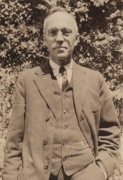Awards
- Honorary Degree - 1968
- D.S.
- Doctor of Science
- Commencement
- Bloomington, Indiana
- Presenter: Elvis Jacob Stahr, Jr.
- National Academies - 1915
- American Association for the Advancement of Science

Fernandus Payle was born on February 13, 1881 in Shelbyville, Indiana. He graduated from Valparaiso University with his B.S. in 1901. In 1905, he graduated from Indiana University with his B.A., and in 1906 he received his M.A. from Indiana University. After completing his studies at IU, he entered Columbia University and earned his Ph.D. in 1909. Payne became assistant professor in the zoology department at Indiana University, where he spent his entire academic career. After promotion to professor in 1919 and the death of Dean Carl Eigenmann in 1927, Payne became Dean of the Graduate School as well as the new chair of the zoology department in 1927. He maintained his administrative positions until 1947, and his professorial position until his retirement in 1951. He was named Dean Emeritus of the Graduate School and Professor Emeritus of Zoology in 1951. Payne is credited with several significant contributions to IU. First, he introduced the study of genetics to the university and attracted cutting edge researchers in the field, like Hermann Muller and Salvatore Luria, who both went on to win the Nobel Prize for their research. Payne was also a renowned researcher, particularly on the effects of aging on the endocrine gland structure of fowl. Payne’s research while a student at Indiana University was morphological and behavioral. He studied blind fauna with Carl Eigenmann. His first paper (1906) was a histological study of the rudimentary eyes of the blind Cuban lizard Amphisboena punctata. At Columbia, Payne began a series of remarkably detailed studies of the toad bug Gelastocoris (formerly Galgulus) oculatus and the kissing bugs (Reduviidae). Payne’s work proved that sex chromosomes are not simply XX = female, X or XY = male. He believed the multiplication of sex chromosomes arose by fragmentation of a single X from an original species having XX female and X male origin, and that the number of sex chromosomes was not the exclusive basis for sex determination. In 1912, Payne worked at the Naples Zoological Station, where he demonstrated that U.S. and European mole crickets of the genus Gryllotalpa differ in chromosome number. Asteroid 2496 Fernandus, discovered October 8, 1953 by the Indiana Asteroid Program, is named in his honor. He served on the board of trustees for Science Service, now known as Society for Science & the Public, from 1953-1954. Payne died on October 13, 1977 at the age of 96.